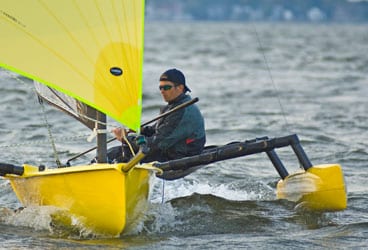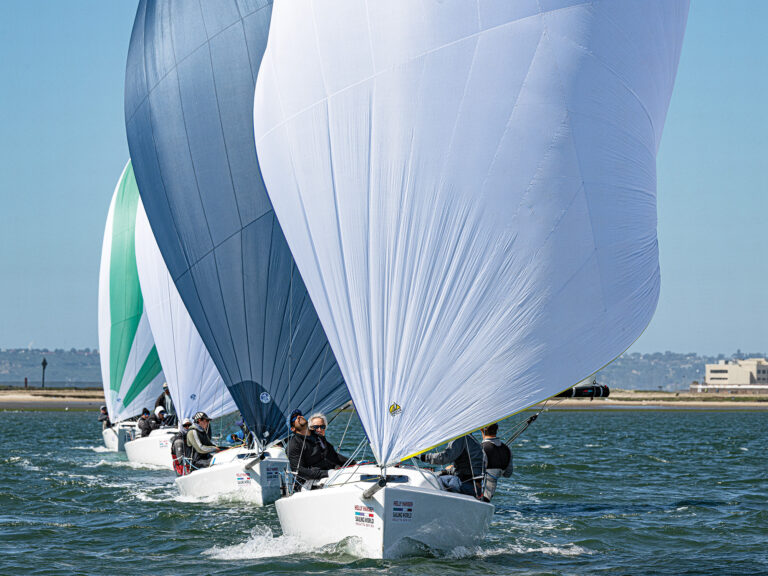
Dave Reed sailing
Stuart Walker is right. In his new book, The Code of Competition, he says there are a few winners, and the rest of us are losers (in the competitive sense, of course). That’s some brutal honesty, Dr. Walker. As much as we think we apply ourselves to improve, with visions of breaking through to the other side, we losers subconsciously go out of our way to ensure that we don’t win, either by creating our own demise or by assisting the winners (have you ever let the top guy in your fleet get away with a minor foul only because you’re happy to be near him?) It’s as if there are two paths for every race—one of self-fulfillment, and one of self-destruction—and which one we take is already chosen. This notion was recently reinforced.
A beautiful day of frostbiting is on tap, and an hour before I typically leave my house, I decide it’s time to break out the new sail I’ve been sitting on for a year. I set about applying the sail numbers, ever so carefully. I meant to prep the sail months ago, but procrastination got the better of me.
This, of course, puts me way behind schedule, and, when I arrive at my boat, I discover a fitting has pulled out of the deck. Luckily, someone nearby has a drill. I have 5200. Repair complete, I hurriedly strip the old sail from my spars (we roll them in the winter), slide on the new sail, step the mast, and notice that all the gooseneck rivets are loose—the thing is practically falling off. This, of course, is my own boat-care negligence.
I frantically ask around for a hacksaw. No luck; next time I’ll have my toolbox. And as boats head to the racecourse, the wind suddenly pipes up: no new sail today. I borrow a rig, and hastily swap sails again. Time to get dressed: there’s only one wetsuit bootie.
I doubt Dr. Walker’s “winners” ever start a day of racing like this.
Missing the first race, I arrive in the final seconds of the second-race sequence: no line sight, no clue where the marks are. I manage a decent start, but minutes later have to duck a long parade of starboard tackers as I try to get around the mark. Next race I let a port-tacker foul me at the mark and I wind up rafted with a pack of boats. Afterwards, I collect my thoughts, breathe deep, and try to mentally start the day anew. I try to psyche myself up: “These are your conditions. Put it all behind you.”
The next race, my boom taps the buoy. Circle. Deep again. The following race, I’m third at the mark and let another boat foul me. I bear away, let the mainsheet run, and watch it snake through the boom blocks until there’s no more mainsheet at my feet. I swear I put a stopper knot in that thing. As the day wears on, I drop the tiller a few times, get stuck in irons at a start, and generally flounder around the racecourse.
“It wasn’t my day,” I think to myself as I de-rig. But Dr. Walker would disagree: you’re a loser, he would say, you’ve accepted your subordinate status. That hurts. But there’s hope yet for you and I, and the larger pool of losers (we certainly outnumber the winners). While we’ll continue to compete because we enjoy being part of the fleet, with a “specific place in the hierarchy,” Dr. Walker assures us some of us will be “dissatisfied with losing and begin to win.” Making the transition, he implies, is attainable. We must believe we deserve to win, he says, and be less accepting of losing. Next weekend, I’m in it to win it.
Dave Reed, Editor
editor@sailingworld.com









